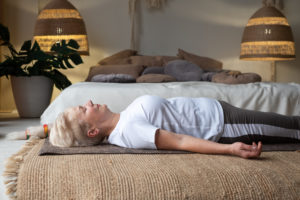Meditation for Sleep
Many people know the feeling of being unable to sleep due to stress. Once sleep problems begin, they can also trigger anxiety around the idea of bedtime, making it even more difficult to fall asleep. Meditation is one technique that people can use to relieve stress at bedtime and fall asleep more easily.
Meditation has a long history, particularly in Eastern cultures, where it was often used in the context of spirituality or religion. In Western medicine, meditation has been studied for several decades with evidence suggesting that it might bring about relaxation and ease stress. We discuss how meditation works, different types of meditation, and how to use meditation for sleep.
Looking to improve your sleep? Try upgrading your mattress.
What Can Meditation Do for Sleep?
Meditation is considered a type of mind-body therapy, because meditation techniques often combine mental work with physical aspects such as deep breathing. By targeting both anxious thoughts and physical stress symptoms, sleep meditation aims to bring about overall relaxation that helps prepare the body for sleep.
On a mental level, meditation techniques are intended to promote a more relaxed response to a person’s stressful thoughts and feelings. Meditation styles often incorporate the idea of mindfulness, or a focus on the present moment with an open, non-judgmental mindset. Meditation may also incorporate a repeated phrase, visual image, or sensation, such as breathing, to help reduce distractions.
Meditation is also designed to trigger a physical relaxation response that counteracts the stress response. While the stress response involves sweating, tension, a rapid heart rate, and faster breathing—all of which are not conducive to sleep—the relaxation response calms breathing, reduces heart rate and blood pressure, and slows brain waves.

Types of Meditation
People may use a variety of meditation styles, often combined with other relaxation techniques, to help them sleep.
Mindfulness Meditation
Mindfulness practices involve concentrating on the present, and they allow a person to experience emotions and thoughts without judgment. Like diaphragmatic breathing and progressive muscle relaxation, mindfulness may help a person relax at bedtime and reduce symptoms of insomnia.
Guided Meditation
In guided meditation, a person may listen to an audio recording that helps direct their thoughts as they meditate. For example, a guided meditation track may tell the person how to adjust their breathing, how to work through their thoughts, or how to interpret physical sensations. Several studies have found that guided meditation programs may help improve sleep.
Guided imagery is another form of guided meditation that leads a person on a visual journey to help elicit relaxation. Guided imagery can incorporate explicit instructions, such as asking a person to imagine they are walking along a tropical beach, or can be more open-ended, such as by instructing a person to imagine they are in their favorite place.
Qigong
Qigong is a traditional Chinese medicine technique that uses mental focus, slow movements, and deep breathing to improve energy flow within the body.
Scientific evidence for the benefits of qigong is still in the early stages, with researchers examining if qigong techniques could help manage pain, improve quality of life, decrease stress and depression, or improve sleep quality.
Tai Chi
Tai chi is a type of meditation that involves constant, gentle movement. Although tai chi was originally developed as a martial art, it is used as a form of qigong currently, to improve health and wellness. People who practice tai chi adopt a series of postures in a slow, relaxed manner while concentrating on breathing deeply and letting go of distracting thoughts.
Yoga
Yoga commonly incorporates mindfulness meditation, diaphragmatic breathing, and stretching-based poses. The exact techniques vary depending on the type of yoga. A yoga teacher can suggest appropriate poses based on a person’s experience level, physical capabilities, and needs.
There are few high-quality studies on the benefits of yoga, though research suggests yoga might be helpful for reducing stress, improving sleep quality, and managing insomnia related to stress or chronic health conditions.
Yoga Nidra
Also known as yogic sleep or psychic sleep, yoga nidra is a type of yoga said to induce a sleep-like state. This state may imitate the brain waves that occur while a person sleeps, even moving through different sleep stages, while allowing the person to retain some level of consciousness. Yoga nidra can incorporate chanting, focus on breathing, and awareness of different body parts.
Research on yoga nidra for sleep is still in the early stages, but studies suggest it may improve sleep qualityand reduce time spent awake in bed.
Potential Benefits of Meditation
Among people who use meditation, many of them do so in an attempt to feel less stressed and sleep better via several different pathways.
- Calmed stress pathways: Like other relaxation techniques, meditation can help slow breathing and lower heart rate and blood pressure. Some data suggests that meditation reduces activation of stress pathways in the brain, as well as levels of stress hormones, helping to reduce anxiety.
- Improved mental outlook: Concentrating on the present moment during meditation may help a person anxiously think about the past or future less often and soften their reactions to difficult experiences.
- Better managed pain: Some studies have found that meditation can reduce pain, while others have not. Even when meditation does not reduce a person’s physical pain, it may help make the pain more bearable. This effect may be useful for people who have trouble sleeping due to chronic pain.
Although more research is needed, evidence suggests that mindfulness meditation may improve sleep quality on a level similar to exercise or cognitive behavioral therapy. Researchers believe this improvement may be due to changes to the way a person moves through sleep stages and the practice of mental techniques that decrease sleep-disrupting thoughts.
To maximize potential benefits, it may help to use meditation alongside other healthy sleep habits, such as keeping regular bedtimes and keeping the sleep environment cool, dark, and quiet.
How to Meditate
There are many types of meditation, and each has its own specific practices. However, most meditation styles have a few concepts in common.
- Concentration: Meditation usually asks a person to focus on a certain object, a repeated phrase, or their breathing. While they focus, they remain receptive to any thoughts that may crop up, but do their best to gently steer their attention back to the object of focus in a non-judgmental manner.
- Quiet environment: Reducing outside distractions can help a person who is meditating enter into a calm state of mind.
- Deep breathing: Breathing in a calm, controlled manner during meditation can promote relaxation. People are usually instructed to concentrate on using the diaphragm muscles that are located below the lungs instead of using the chest muscles.
- Comfortable position: Meditation can be practiced while sitting, but it can also be performed while standing, walking, lying down, or adopting specific postures and movements.
Those who are interested in trying meditation for sleep can learn different techniques through a class or book. There are also many meditation soundtracks available on popular video and audio streaming platforms, as well as dedicated smartphone applications and podcasts. Meditation techniques are often fairly easy to do at home via live or recorded classes. When using sleep meditation audio tracks on a smartphone before bed, be sure to dim or turn off the screen.
An Example Meditation for Sleep
It may take practice to master the art of relaxing and letting the mind be at peace. A good place to start is with a simple meditation exercise that involves breathing exercises for sleep.
- Turn off the lights and phone notifications, set the thermostat to a comfortable temperature, and sit upright in a chair with your feet on the floor or lie comfortably in bed facing up. Place one hand on your chest, the other on your midsection.
- Breathe in slowly through the nose. The hand on your midsection should rise, while the hand on your chest should stay still. This is called diaphragmatic breathing.
- Breathe out slowly. Repeat 10 calm, controlled breaths, always making sure to use your diaphragm instead of the chest muscles.
- Clear your mind and focus on breathing. Try not to become anxious if negative thoughts appear. Acknowledge them, then let them go and return to a place of peace.
Does Meditation Have Any Risks?
Although meditation for sleep does not pose risks for most people, a small percentage of people may experience mental discomfort, particularly those with pre-existing mental health conditions, addiction, or a history of trauma. Possible risks associated with meditation include:
- Poorer sleep quality
- Muscle soreness
- Disorientation or confusion
- Negative feelings such as sadness, anxiety, or anger
- Heightened awareness of fears or one’s own negative qualities
- Intrusive thoughts
- Fear of losing control
People who have experienced anxiety or panic disorder, especially those who have hyperventilated in the past, should be careful when trying deep breathing. In some cases, relaxation techniques can trigger anxiety or panic attacks.
Meditation may be helpful when dealing with stress, but it is not a replacement for medical care. People who have symptoms of a mental or physical health condition, including a sleep disorder, should talk with their health care provider for treatment.

Still have questions? Ask our community!
Join our Sleep Care Community — a trusted hub of sleep health professionals, product specialists, and people just like you. Whether you need expert sleep advice for your insomnia or you’re searching for the perfect mattress, we’ve got you covered. Get personalized guidance from the experts who know sleep best.
References
7 Sources
-
National Center for Complementary and Integrative Health. (2022, June). Meditation and mindfulness: What you need to know.
https://www.nccih.nih.gov/health/meditation-and-mindfulness-what-you-need-to-know -
Rusch, H. L., Rosario, M., Levison, L. M., Olivera, A., Livingston, W. S., Wu, T., & Gill, J. M. (2019). The effect of mindfulness meditation on sleep quality: A systematic review and meta-analysis of randomized controlled trials. Annals of the New York Academy of Sciences, 1445(1), 5–16.
https://pubmed.ncbi.nlm.nih.gov/30575050/ -
Canfield, M. J., Cremins, M. S., Vellanky, S. S., Teng, R., & Belniak, R. M. (2021). Evaluating the success of perioperative self-guided meditation in reducing sleep disturbance after total knee arthroplasty. The Journal of Arthroplasty, 36(7S), 215–220.e2.
https://pubmed.ncbi.nlm.nih.gov/33663887/ -
National Center for Complementary and Integrative Health. (2022, February). Qigong: What you need to know.
https://www.nccih.nih.gov/health/qigong-what-you-need-to-know -
Sharpe, E., Lacombe, A., Butler, M. P., Hanes, D., & Bradley, R. (2021). A closer look at yoga nidra: Sleep lab protocol. International Journal of Yoga Therapy, 31(1), Article_20.
https://pubmed.ncbi.nlm.nih.gov/33175980/ -
Datta, K., Tripathi, M., Verma, M., Masiwal, D., & Mallick, H. N. (2021). Yoga nidra practice shows improvement in sleep in patients with chronic insomnia: A randomized controlled trial. The National Medical Journal of India, 34(3), 143–150.
https://pubmed.ncbi.nlm.nih.gov/34825538/ -
Bystritsky, A. (2021, February 19). Complementary and alternative treatments for anxiety symptoms and disorders: Physical, cognitive, and spiritual interventions. In M. B. Stein (Ed.). UpToDate.
https://www.uptodate.com/contents/complementary-and-alternative-treatments-for-anxiety-symptoms-and-disorders-physical-cognitive-and-spiritual-interventions




